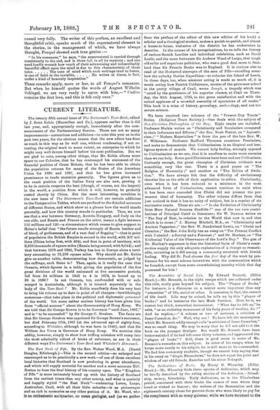We have received two volumes of the " Present-Day Tracts"
Series. (Religious Tract Society.) —One deals with the subject of Non-Christian Philosophies of the Day. Eight tracts are included. Professor Blaikie writes on "Christianity and Secularism compared in their Influences and Effects ;" the Rev. Noah Porter, on "Agnosti- cism ;" " Modern Materialism " is from the pen of the late Rev. W. F. Wilkinson. Professor Radford Thomson examines Pessimism, and seeks to demonstrate that Utilitarianism is an illogical and irre- ligious system of morals. We cannot help feeling, strongly opposed to Utilitarianism as we are, that it is needless to make more enemies than we can help. Some good Christians have been and are Utilitarians. Curiously enough, the great champion of Christian evidence was something very like one. There is a good paper on " The Religion of Humanity ;" and another on " The Ethics of Evolu- tion." We have always felt that the difficulty of evolutionary theories lies on the side of their application to ethics. Christianity, even when it has been reduced to a minimum in the most advanced form of Unitarianism, cannot continue to exist when it has been once conceded that Christ did not present the per- manent ideal of humanity. The other volume differs from that just noticed in that it has no unity of subject, but is a reprint of six successive tracts. These six are :—" Is the Evolution of Christianity from Mere Natural Sources Credible ?" one of the too rare contri- butions of Principal Caird to literature; Sir W. Dawson writes on " The Day of Rest, in relation to the World that now is, and that which is to come ;" J. Murray Mitchell, M.A., on "Christianity and Ancient Paganism ;" the Rev. W. Sunderland Lewis, on " Christ and Creation ;" the Rev. John Kelly has an essay on " The Present Conflict with Unbelief : a Survey and a Forecast ;" and Dr. Maolear, on "The Evidential Value of the Observance of the Lord's Day." The gist of Dr. Maclear's argument is that the historical facts of Christ's resur- rection supply the only adequate explanation of a change so remark- able, occurring as it did among a community saturated with Jewish feeling. Why did St. Paul choose the first day of the week by pre- ference for his most solemn interviews with the communities which be founded, except from some overwhelming sanctity which that day possessed for him ?


































 Previous page
Previous page